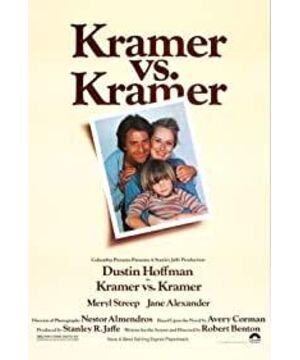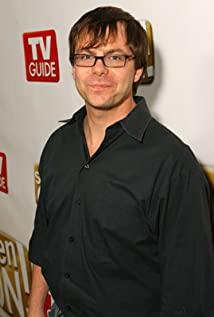The story is not complicated: Mr. Kramer is busy with work, ignoring his family, his wife cannot bear such a life and ran away from home, leaving behind a young son. Mr. Kramer had to start a life of being a father and a mother again. During this period, Mr. Kramer overcame all the troubles in life and work, and the father and son became more and more intimate and dependent on each other. A year and a half later, the successful wife returned to New York, and the old couple started a multi-child war.
The beginning of the movie was the scene where the wife left her husband, which reminded me of "Road to Revolution". It is also a description of the family life of the middle class in the United States, and the same is the woman's dissatisfaction with her own life, but Aibo did not leave the house in the end and did not go to Paris. In the play, Mrs. Kramer chose to leave the family and went to California after repeated thinking, and later realized her value. It is said that one of the reasons why this movie was so popular is that the story fits the divorce fever of the middle class in the 1970s due to the conflicts between emotions and their own values. It's getting farther and farther, obviously this social issue is not the theme of the movie, but the real theme of the movie is paternal love, it is family affection.
In the days when the father and son depended on each other, we saw the changes of this father. From the beginning, he was an impersonal workaholic who only talked about how to work, and then gradually became: for the custody of his son, he would rather find a job at a lower price. He humiliated his father; the child rushed all the way to the hospital with his son after being injured, and the brave father who had been guarding his son when he was stitched; the one who told the son that the mother left was not his fault but his own fault, the one who was sleeping in the son The tender father who covered his quilt and folded clothes. This father is neither pretending to be deep nor tall and strong. He is ordinary and trivial, hidden in the city, in life. But the deepest love for the child, the warmth of ordinary life, patience and bravery made him a great father in the eyes of his son, neighbors, and our audience.
Just like what the female neighbor said to Mrs. Kramer in court later: He has changed. If you see his love for his son and their mutual love, you will withdraw your application. It is precisely because the wife is so moved by seeing the transformation of the workaholic husband of the past and the meticulous care of the child that she chooses not to take the child away after obtaining custody.
I have to say that the performance of the three protagonists in this film is really outstanding. Dustin Hoffman is undoubtedly the central character of the film. His performance is indistinguishable. He has a good grasp of "degree". There is a detail in the play: on the first morning after his wife leaves, the husband fries for his son. Sina's "horror" process makes people laugh. At the end of the story, the father fried French toast for his son again, of course this time it was very methodical. This detail is very ingenious. When it first appeared, the frantic appearance of the father made people laugh, and it also alleviated the contradictions at the beginning of the story, allowing the audience to enter the state better. The final appearance not only echoes the front, but also enables the audience to experience the transformation of the father and the warmth of the father and son. Of course Hoffman's performance definitely adds points to these plots. Mei Gu doesn't have many roles, but she still plays perfectly, even her eyebrows can act. When she was young, she was pretty and charming. And the son's performance is exceptionally brilliant, not only is he very cute, but there are not many children who act so naturally.
A typical Hollywood three-stage movie, with classical techniques, without too much fancy, and without expressions of ideological themes that are too deep to make people understand. But through the delicate and smooth portrayal of the movie, the ordinary and great paternal love for his son realized by this ordinary father touched me. What is a good movie? There are many answers, but this touching movie is definitely one of a kind.
View more about Kramer vs. Kramer reviews











